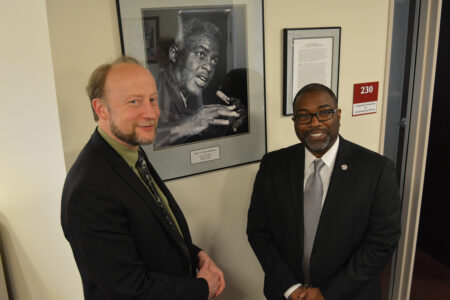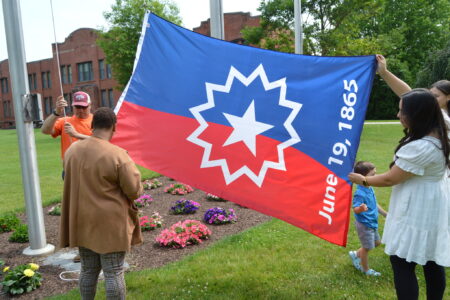The third annual Springfield College (S)ocial justice, (E)quity, (A)ccountability (T)ransformation at the Table Week took place from Nov. 7 through Nov. 11, with this year’s format allowing for a combination of in person and virtual formatting.
With more than 35 sessions from which to choose this year, participants were able to select from a variety of sessions focused on important issues. The week-long panel discussions and interactive workshops offered educational experiences across media, pedagogies, and practices, dedicated to deconstructing oppressive systems and transforming our community toward equity for all. The SEAT at the Table Week is organized by members of the Office of Multicultural Affairs and the Collaborative Council.
SEAT (Social justice, Equity, Accountability, Transformation) at the Table Week is a conference of educational experiences across media, pedagogies, and practices, dedicated to deconstructing oppressive systems and transforming our community toward equity for all. The goal of SEAT at the Table is to educate our community on topics related to social justice, identity, power, privilege, positionality, and radical community care.
“In short, I do want to express that I am extremely pleased and proud of our staff, students, and collaborative community,” said Springfield College Vice President for Inclusion and Community Engagement Calvin Hill.
What’s It Like to Be a First
Presented by Springfield College President Mary-Beth A. Cooper, PhD, DM, and Vice President for Inclusion and Community Engagement Calvin R. Hill
Cleveland E. and Phyllis B. Dodge Room (A&B), Flynn Campus Union
This interactive session facilitated by President Cooper and Vice President Hill addressed the opportunities and challenges of being first. Topics of conversation included President Cooper’s experience of being the first female president of Springfield College, as well as Hill’s thoughts on what it’s like to serve in an inaugural position. They also explored local and national firsts, and what those firsts mean (from being a first-generation student, to the first BIPOC individual to serve as president of the United States).
Dismantling the Dynamics of Racial Microaggressions
Presented by Kushal Bhandari
Cleveland E. and Phyllis B. Dodge Room (A&B), Flynn Campus Union
As an international student, Kushal Bhandari has fallen victim to racial microaggressions at Springfield College, so he decided to speak on this sensitive yet significant topic. It is a form of racism that doesn’t produce noise and is often invisible to perpetrators. Intentional or unintentional, this form of racism hurts the sentiments of BIPOC. The primary goal of his discussion was to take apart the pieces of such microaggressions and discuss how they rejuvenated from something as rudimentary as a small joke and led to offending someone. Moreover, the objective was to learn and discuss many ways to acknowledge and avoid such instances in the future.
Addressing Anti-Blackness with Pan-Asian Communities (Virtual)
Presented by Jennifer Tarm
Even though the world was navigating the COVID-19 pandemic for the first time, historical racism has been an ongoing pandemic itself. With the rise of the Black Lives Matter (BLM) movement, the summer of 2020 sparked a racial reckoning for the Asian and Asian American and Pacific Islander (AAPI) communities. During this time, API/AAPI communities were confronted with its cultural history of internalized racism and anti-Blackness as well as analyzing the perpetuation of white supremacy. This introductory session highlighted some historical roots and sociocultural contributions to anti-Blackness within the API/AAPI communities and culture. Various social justice frameworks were also introduced as approaches to challenging and dismantling the systems of white supremacy and anti-blackness.
Resilience: Past, Present, Future of Gynecology
Presented by Mikaili Charlemagne
Cleveland E. and Phyllis B. Dodge Room (A&B), Flynn Campus Union
This presentation explored the development of gynecology and its modern-day implications for women of color. It also included a discussion about the role that discrimination plays in modern gynecology, and maternal and child health statistics.
50 Years of Gender Equity on Campus: An Exploration of Title IX (Virtual)
Presented by Erin Leeper
in 1972, Title IX of the Education Amendments was passed by congress to eliminate discrimination based on sex in education programs. Over the last 50 years, colleges and universities have seen a shift in opportunities across their programs for students who identify as women, transgender, and non-binary as a direct result. this session will provide an overview of the major historical advancements for sex/gender equity on campus interwoven with the effects of the ever-changing legal landscape and end with an eye towards the future of creating placecs of belonging for all students.
Black Fatigue: How Racism is Destroying Black Bodies (Virtual)
Presented by Danielle Farrar
This presentation was intended to bring about awareness of the dangers of “Black fatigue.” Danielle Farrar gave an overview of Black fatigue and addressed how the chronic stress of experiencing racism is playing a major role in the health disparities associated with the Black community. Specifically, the presentation showed how chronic racial stress is linked to increased rates of diabetes and heart disease in Black individuals. It is Farrar’s hope that in bringing attention to this fatal issue, it will spark an interest in redefining the Black health narrative.
Save Our Spoons: Grind Culture and the Disabled Community
Presented by Randi Berry, Wyatt deFriesse, and Kenny Dalton
Cleveland E. and Phyllis B. Dodge Room (A&B), Flynn Campus Union
Staying fed, daily hygiene, and attending class: completing all of those tasks is a daily balancing act for some members of the Springfield College community. In this session, attendees learned about the Spoon Theory relating to managing chronic illness and disability, try your hand at a triage of daily living needs with our interactive Save Our Spoons activity, and learned about the impacts that toxic productivity and “grind culture” can have on the disabled community and the Springfield College community at large.
Discrit (Disability Studies in Education and Critical Race Theory): Examining the Intersections of Disability and Race (Virtual)
Presented by Sara Scribner and Brianna Dickens
During this session, the presenters outlined DisCrit as a critical theoretical framework, illustrated one example of these intersections using federal educational data, and engaged participants in an interactive application of the theory through scenario consideration. Participants left this session with a deeper understanding of DiCrit and how race and disability intersect.
The Social Justice History of Springfield College
Presented by Martin Dobrow
Cleveland E. and Phyllis B. Dodge Room (A&B), Flynn Campus Union
Springfield College is way more than just the Birthplace of Basketball. The school has a longstanding history of social justice aspiration. At times, we have lived up to the ambitions words in our mission about “leadership in service to humanity.” At times, we have fallen short. This presentation took a long, historical view to explore the sometimes remarkable experience with social justice of the College. The selective history is far from exhaustive, but it focused on some of the Springfield College inspirational social justice leaders, from the school’s founding right through the present day.
To Heal: A Discussion on Race, Law, Education, and Teaching
Presented by Greg Coogan
Cleveland E. and Phyllis B. Dodge Room (A&B), Flynn Campus Union
This session featured a discussion on how American law has been historically used to oppress people of color; how law and policy are wielded to perpetuate racism, inequality, and injustice within the education system; and how restorative justice and trauma-informed pedagogy can be foundational tools of healing, love, and community.
Unraveling Misconceptions of Hair: Micro-agressions and Post Historical Trauma (Virtual)
Presented by Simone Alter Muri and Naarah Macklin
The purpose of this workshop was to expand knowledge of how microaggressions affect minority groups and the connection to post-historical trauma. Microaggressions are examined in this workshop through the stereotypes about hair. Hair can be a symbol of identity and a vehicle for discrimination and internalized oppression. This is especially true in African American and BIPOC communities. Presenters addressed and explored the topic of hair, in relationship to race and post-historical trauma. The presenters shared examples from contemporary artists, and their own experiences. Participants learned how visual art can be a catalyst to begin conversations, bring awareness to cultural identity, and address microaggressions.
Emancipation of Our Minds: A Therapy Session for People of Color
Presented by Paris Lizana
Cleveland E. and Phyllis B. Dodge Room (A&B), Flynn Campus Union
Based on Ibram X. Kendi’s book Stamped from the Beginning, this lecture and discussion explored the ways in which white supremacy influences the actions of people of color and how they take a toll on how we present ourselves in society. Paris Lizana’s goal is for people of color to walk away feeling relieved of the burden of representing their entire race in the spaces they enter and feel that they can be themselves without being enslaved to the idea of perfection. This lecture and discussion showcased a brief history of how white supremacy has created this invisible pressure for people of color to be their best all the time and suggested ways to reject these ideals.
My Community Does Not Look Like Me
Presented by Sue Scheppele
Cleveland E. and Phyllis B. Dodge Room (A&B), Flynn Campus Union
This session helped participants make sense of and explain bias. Participants explored the various aspects of identity; reflected how identity consciously shapes one’s worldview; and applied this understanding to recognize the relationship between identity, bias, and power. Participants, through hands-on activities, recognized the value of diversity in society; adopted a vocabulary for speaking about differences, prejudice, and discrimination; and developed strategies to communicate across differences.
Intergenerational Trauma and YOU (Virtual)
Presented by Deepashree Karve
Intergenerational trauma is often identified in marginalized communities and underrepresented populations. Students belonging to racially marginalized communities, from the underserved population, or even children of immigrants often get confused about their struggles and fail to understand where their trauma is coming from. Deepashree Karve wants to create awareness about intergenerational trauma and how valid that in in underrepresented minorities.
History of SEAT at the Table
Summer 2020 was filled with many emotions, but for Black, Indigenous, and people of color, specifically for those who identify as Black/African American, it was traumatic. During these moments, the Office of Multicultural Affairs (OMA) staff jumped into action to come up with a 2020 fall semester plan to approach what was happening in the country. This plan included creation of an extensive diversity conference called (S)ocial justice (E)quity (A)ccountability (T)ransformation (SEAT) at the Table Week.







